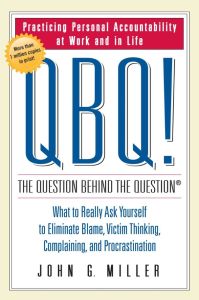Join getAbstract to access the summary!

Join getAbstract to access the summary!
John G. Miller
QBQ! The Question Behind the Question
Practicing Personal Accountability at Work and in Life
Putnam's, 2004
What's inside?
You don't have to be a player in the blame game. Take ownership of your actions and become accountable in your life.
Recommendation
Author John G. Miller admonishes people to quit whining! Miller advocates personal accountability, an almost novel concept in today’s litigious world of finger pointing, excuse making and not-my-fault thinking. Instead of asking, "Why is this happening to me?" he says to ask, “What can I do to improve my situation?” Miller calls this the “QBQ, the Question Behind the Question.” When you ask such questions you become less of a victim, and put yourself more in control, empowered to improve your life and contribute to the success of your organization. Miller entertains and explains by using examples and uplifting stories culled from his personal experience. His easy-to-grasp theory is fairly one-dimensional and in the banquet of self-help books, it is more of an appetizer than an entrée. Yet, if you want a quick bite of applicable self-improvement advice and don’t mind a bit of a scolding, getAbstract recommends this tasty treat.
Summary
About the Author
John G. Miller founded an organizational development firm in Denver, Colorado. He is a frequent public speaker and a consultant to major companies. He is also the author of Personal Accountability and Flipping the Switch.

















Comment on this summary